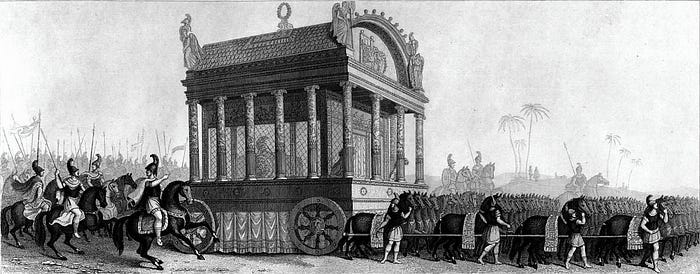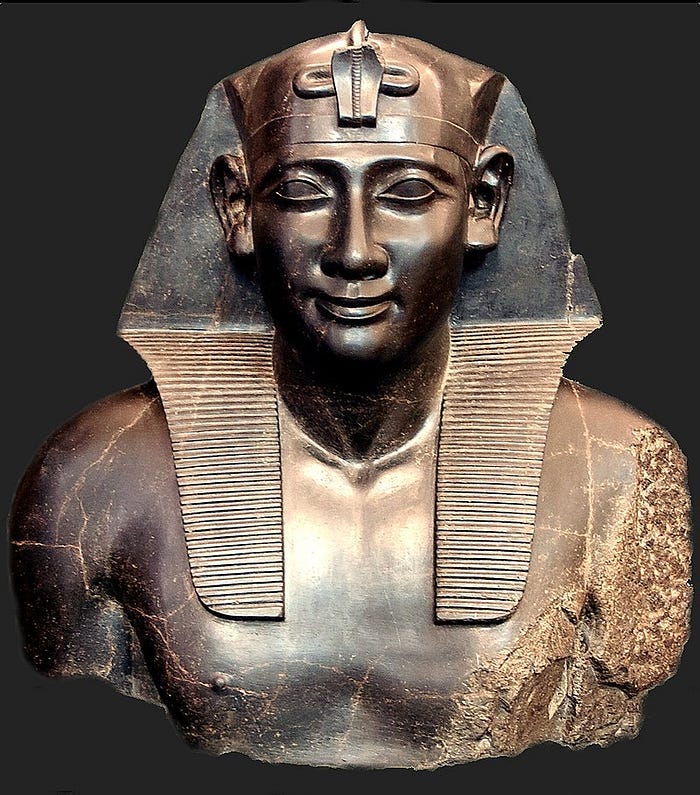Why Alexander The Great’s Body Rested In Egypt
Solidify your reign by stealing the emperor’s body
Alexander The Great’s Body Became A Fixture In Egypt For Centuries - Created By Author In Starryai
“Perdiccas, Ptolemy, and Seleucus argued over every conceivable resting place for the dead king’s remains. No record survives of the horse-trading and negotiations that stretched over the next two years, fueled by mutual suspicion over Alexander’s postmortem future, but they must have been intense. Never before had a corpse so influenced the conduct of the living and even the future shape of the world.”
— Nicholas J. Saunders, Alexander’s Tomb: The Two-Thousand Year Obsession to Find the Lost Conqueror
Growing up, I heard countless tales of Alexander The Great. His story was so sensational, it fit right into the pantheon of fictional stories most kids grew up with: Star Wars, Lord of the Rings, Jason and the Argonauts, etc. Add one of your own similar ones, and larger-than-life Alexander fits right in. He appears to be the ultimate underdog who conquers the world — literally.
Call him Luke Skywalker — the kid from a backwater desert moon — who defeats the all-powerful emperor. We’re not going here though.
Something always nagged at me. Not necessarily about his life, but his death. It started when I heard a story of Julius Caesar visiting Alexander’s tomb in Egypt. Then, Octavian later visited after Cleopatra’s death. Other notable Romans followed.
It wasn’t that Romans were paying tribute to the Macedonian. But why was he in Egypt? You figure the greatest character in the history of his culture would be buried in his homeland. Or even in his administrative center of the empire, Babylon.
It only makes logical sense.
Then I heard a greater story. Even in death, Alexander’s shadow was so large, possession of his body could legitimize one’s power, like a macabre scepter. His inner circle fought over his corpse for their own glory. The emperor’s funeral carriage was even hijacked.
It seems almost fitting the legendary character who led a life worthy of fiction would give us another great story even after he died.
It’s a story of back-stabbing ambition, creation of a dynasty, and general human greed. Think of a mixture of Game of Thrones, The Godfather, and Weekend at Bernie’s. But the winner might own the world by taking possession of a dead body.
This is the final tale of Alexander The Great.
Who Replaces A Legend
“For I have been wounded with the sword…I have been shot with arrows, and I have been struck with missiles…and though oftentimes I have been hit with stones and bolts of wood for the sake of your lives, your glory, and your wealth, I am still leading you as conquerors over all the land and sea, all rivers, mountains, and plains. I have celebrated your weddings with my own, and the children of many of you will be akin to my children. Moreover I have liquidated of all those [debts] who had incurred them, without inquiring too closely for what purpose they were contracted, though you received such high pay, and carry off so much booty…after a siege. Most of you have golden crowns, the eternal memorials of your valor and of the honor you receive from me.” — Speech by Alexander at Opis, as reported by Arrian
In his book The 48 Laws of Power, Robert Greene explains in many ways Alexander was the opposite of his father Phillip. The son relied more on action than cunning. After Phillip’s death, many local vassals revolted, and Alexander’s advisors recommended caution.
The new king disregarded the advice, riding out with his army to beat his allies into submission. He continued afterwards, taming the Persian Empire. Alexander even stretched into India. A team of talented generals followed him, but none dared to challenge him as king.
He was larger than life. Perhaps the most famous person ever to live. As he laid dying in Babylon, this complicated things. Who could replace a figure this legendary?
Archeologist Nicholas J. Saunders says Alexander left a wife and small child. On his deathbed, the king handed over his ring to Perdiccas. Although he was to rule as a temporary regent, holding the place for the boy.
But according to Saunders, each “marshal” had a plan for the empire and its fortune. Alexander’s wishes be damned.
Perdiccas played up his role as regent, but had his own designs on becoming king permanently
Ptolemy, a wise general and childhood friend of Alexander, had ambitions of creating a dynasty within Egypt
Seleucus leaned towards Perdiccas, but had his own ideas for the empire
Antipater, Alexander’s regent in Macedonia, was far from Babylon but had troops and influence to sway the scales of power
Alexander also had a mentally handicapped brother and powerful mother who were both used to position challengers closer to the throne
But there was one more odd thing in this ever-changing power struggle. By tradition, burying a king gives you special status. Saunders sums it up this way:
“Alexander’s corpse was a key to the future of the Hellenistic world he had brought into being. His reputation as the greatest conqueror in history made his body a magnet for soldiers who would flock to the banner of his successor…According to Macedonian rites, the one who buried a king received honor and legitimacy as a potential ruler himself.”
Now, the burial of this towering figure would be more than a spectacle, it could make or break the future ambitions in the new hierarchy replacing Alexander. Not only the ceremony itself, but where it was held, and the resting place of the body.
Alexander’s corpse sat for two years while the greedy living argued, positioning themselves for pieces of the left-over empire.
An Emperor’s Funeral Procession Gets Hijacked

Saunders notes Alexander wanted to be buried at the Oracle in Siwa, within Egypt. Linking him to his heavenly father Zeus Ammon. But this would put the body into the hands of Ptolemy. Conservative Macedonians wanted their king’s body home. Whereas Perdiccas and Seleucus preferred it in Babylon.
The sniping parties came to an agreement to leave the body in Babylon until a proper funeral cart for Alexander could be produced.
During the two years, one of the most luxurious hearses ever created took form. Saunders quotes Diodorus Siculus as saying the cart was thirteen feet wide and twenty long, looking like a moving Greek temple. Golden lions guarded the entrance and large paintings hung on each side.
The massive cart needed a team of more than sixty mules to slowly move it.
The cart was finished as Perdiccas traveled with the royal army to put down a revolt. But the funeral procession began to move with the regent away. Without Perdiccas’ authority, the creator of the cart loaded Alexander’s body and started moving the royal hearse towards Egypt.
The regent sent two lieutenants with a light force to catch the procession when he heard of the treason. As they arrived, Ptolemy “coincidentally” appeared heading a large army to meet the wagon. The general took the caravan to his capital of Memphis.
Ptolemy buried Alexander quickly in a lavish ceremony according to Macedonian tradition in Egypt. He also turned Antipater to his side. After Perdiccas snubbed a marriage proposal to Antipater’s daughter in favor of Alexander’s sister, the Macedonian general was enraged.
While Perdiccas would invade Egypt, he’d now have to divide his forces to defend against Antipater.
The Battle Over A Body
While Perdiccas gathered a force to attack Ptolemy, Egypt was garrisoned in preparation. Ptolemy used the king’s body as a rallying cry in his new home. Likewise, Perdiccas used Alexander’s armor and throne (his spirit) to draw soldiers to his cause. His lieutenant Eumenes also claimed to commune with the former king’s ghost.
As Perdiccas led a royal army to Egypt, Ptolemy was tried by an assembly of army officers and found innocent of treason. Saunders thinks it was an attempt to avoid civil war. But negotiations were fruitless.
Perdiccas forced two disastrous all-out attacks, which Ptolemy expertly rebuffed. The last saw thousands of Macedonians drowning in the Nile. Afterwards, the army turned on Perdiccas and killed him.
Ptolemy graciously met with the enemy force soon after. The royal army even offered him the vacant regency. The tactician Ptolemy declined, stating he only wished to rule Egypt, which an assembly of powerbrokers granted him. However, this was just the first stage of his plan.
Making The Legend A God For His Own Purpose

“Ptolemy had the future of Alexander’s body and tomb firmly in his sights from the beginning. He buried the king at Memphis with a vision of later moving the body to a grand tomb in Alexandria. His first priority now was to reshape Egypt’s religious and political landscape to support the various cults that would establish a regime of Ptolemaic rule sanctified by the living god Alexander. Ptolemy’s strategy, especially how he planned to turn Alexander’s tomb into the most famous mausoleum of the ancient world, is revealed by the strange hybrid world he created in the years following his defeat of Perdiccas.”
— Nicholas J. Saunders, Alexander’s Tomb: The Two-Thousand Year Obsession to Find the Lost Conqueror
The new Pharaoh of Egypt deified Alexander, using a mixture of Egyptian religion and Greek symbolism to create a cult to the new god-king. It also enhanced the status of Ptolemy. He now led a dynasty whose firm grip would guide Egypt for about three-hundred years.
In fact, I earlier mentioned Octavian visited the tomb after Cleopatra’s death. She was a distant relative of Ptolemy, being the last of his line. Strangely, she was the first in the dynasty to speak Egyptian, according to historian Barry Strauss in The War That Made The Roman Empire. The cult of legitimacy Ptolemy created was so strong, the dynasty didn’t need to speak the language of the people they ruled for generations.
So, even in death Alexander’s story continued. His body powered a dynasty of foreigners who ruled Egypt for centuries and the legend — now turned god — even fell on the royal shoulders of Cleopatra. Even with the dynasty’s demise, the Romans continued their respects to Alexander.
So, why was Alexander entombed in Egypt? Even his corpse was a symbol of power and an icon of respect — the ultimate scepter — worth fighting and dying over.
-Originally posted on Medium 5/7/22



